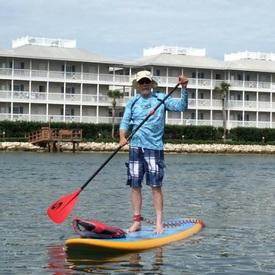Motivation tips

Shieldmaiden22
Posts: 17 Member
What's your best motivation tip to keep going when things get hard!
1
Replies
-
Think in terms of abilities, not aesthetics. Eg. I want to be able to go on that hike, or try rock climbing or fit comfortably in the seat at X.3
-
Best way to stay ‘motivated’ to stick to your plan is to have a manageable plan in the first place; don’t chase some crazy aggressive target such that you feel deprived and end up bingeing. Set a slow and realistic rate of loss and use an app like Happy Scale so you can set your expectations for how long it’ll take to reach goal weight and if you’re tracking on the right trajectory. Happy Scale also has mini goals so you could set rewards for reaching each of these if you think that would help you.
For me personally the motivation comes from looking and feeling better and being more comfortable in my own skin. Plus improving my W/kg on Zwift for bike riding.3 -
That every day is a new day, with new opportunities and a wonderful chance to start fresh and try it again.
 3
3 -
sarabushby wrote: »have a manageable plan in the first place
This2 -
Acknowledge that things will get hard. You might have the best laid plans and then life will happen, it just does.
So prepare now, before it will happen. Think of solutions that might work for you when you get hangry or have cravings, when you will be at a party, the kitchen at work will be loaded with sweets, or don't/can't go to the gym. Write those down and keep them at hand. Better still, read them every day.
Be prepared and don't assume things will stay as they are.3 -
Someone once told me I had discipline because I set a goal to read a book by X date and was finishing the book at a bar meetup with my friends. I didn't know that compliment would take me to reaching fitness goals as well. I'm not even close friends with the guy but the thought of someone believing I had discipline as a character trait keeps me going to the gym when I'm having a lazy day and keeps me from overeating when it would be just so easy to do it. Does it make a whole lotta sense? No but it works for me. And you're here reading this! That means you had enough motivation to start this challenging journey and I believe you have discipline to keep it going
 1
1 -
Motivation is not a thing I can sustain every minute for every day of my life, and I want to be at a healthy weight and reasonably fit permanently.
To my mind, that puts a premium on experimenting and finding new habits - eating and activity patterns - that I can continue pretty happily forever, almost on autopilot.
The less motivation required, the better. Ditto for will power, discipline, . . . etc.
3 -
What the previous poster said.
Create an eating and moving pattern that you enjoy and can sustain for the rest of your life. It’s highly individual. Ignore anything that is a quick fix.0 -
The motivations are:
- All family members that have died have been from cancer, and being more healthy daily decreases the risk.
- Health issues that run in the family, namely obesity.
- Not feeling like crap as often.
- To look in the mirror and still feel like I can see the energetic young adult I once was (recognize the self that I feel like I know).2 -
Back in with something that I guess some would call a motivation.
I'm already fairly old, 67. I lost weight (finally) at 59-60, after about 30 previous years of overweight/obesity, and have been at a healthy weight since. But I got athletically active in my 40s.
That meant I had a bunch of friends who were recreational athletes my age and older. By coincidence, I also had a bunch of friends who were recreational mixed-media artists. I value all of those people hugely as wonderful human beings with many great qualities, and as friends. But there was a huge contrast, on average, between people in those groups, by the time folks got to be in their 50s-60s for sure, and often even earlier.
The artist group, with a few exceptions, were overweight and not very active. As a consequence, most of them were sicker more often, needed more surgeries, took longer to recover post-surgery, took more medications (with side effects), weren't able to do fun things that involved lots of walking or stairs (such as art festivals, music festivals, stadium events), had dietary limitations because of health conditions or drug contraindications. (They may've gotten there by eating and drinking whatever they wanted, but they weren't able to eat/drink a full range of things anymore, without dire health consequences in some cases.) They spent more of their budget on things related to health care (so less to spend on enjoyable things at same income), and either had to hire a lot of home maintenance stuff done or have their adult children help them, because of physical limitations. Sadly, they also tended to die younger, and have a longer period of illness and disability on route to that stage.
Obviously, there were exceptions, but that was the generality I was observing, in contrasting them with recreational athletes of similar age. I was one of the few recreational athletes who was obese, though there were some who were somewhat overweight. Even those at similar weight to similar-age inactive people were more functional in what they could do, and in overall health status. They needed fewer medications, had fewer illnesses, needed fewer surgeries, and recovered more quickly and smoothly from illness/surgery if it happened. They could splurge sometimes on food/drinks, just as they could when younger. They could do a lot of active things for fun, without strain. They were more independent. Obviously, bad things can still happen, resulting in death, but in this group it was more likely to be good quality of life, then a shorter sharp decline before they died.
Clearly, this is a "generally, on average" kind of thing . . . but it became viscerally evident to me that I was not doing myself any favors by staying obese, in terms of quality of life at that moment let alone in the future. I had bad health markers, and some health issues, even though I was athletically active and surprisingly fit for a fat woman. Overweight and inactivity lead to worse quality of life, on average. I wanted better.
It was stupid of me, frankly, to wait to get active until my 40s, and wait to lose weight until almost 60. I wish I'd been smarter, earlier. At this point, I have a pretty clear, very visceral understanding that if I want to give future Ann the best odds of a happy, healthy independent life, I need to stay healthy weight, plus be active. I feel better and can do more now, at 67, than I could in my early 40s. Life is just better. That's a big deal.
So, maybe it's not day to day motivation when a cookie or pizza or nap is tempting . . . but look around at people in your life, and think about what future you'd like to create for yourself, and what behaviors now will give you the best odds of a decent future. (You don't need to be perfect every second to shift the odds, just better most of the time.)
Do some people beat the odds, or have the odds fail them? Sure. But not most.1 -
What has worked for me is setting a few mini goals at a time and keeping track of non scale victories.1
Categories
- All Categories
- 1.4M Health, Wellness and Goals
- 398.2K Introduce Yourself
- 44.7K Getting Started
- 261K Health and Weight Loss
- 176.4K Food and Nutrition
- 47.7K Recipes
- 233K Fitness and Exercise
- 462 Sleep, Mindfulness and Overall Wellness
- 6.5K Goal: Maintaining Weight
- 8.7K Goal: Gaining Weight and Body Building
- 153.5K Motivation and Support
- 8.4K Challenges
- 1.4K Debate Club
- 96.5K Chit-Chat
- 2.6K Fun and Games
- 4.8K MyFitnessPal Information
- 12 News and Announcements
- 21 MyFitnessPal Academy
- 1.6K Feature Suggestions and Ideas
- 3.2K MyFitnessPal Tech Support Questions









